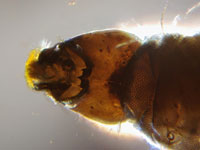Mosquitoes revive after 12 months of living in open space
Over 80 percent of Chironomidae Mosquitoes larvae retrieved their viability after they had been kept in open space for 12 months. The results were unveiled as a result of the second stage of Biorisk-ISS experiment, which took place from June 2007 to July 2008 on board the International Space Station.

“The results showed that the chironomidae larvae could survive and completely retrieve their metabolism, which proved that multicellular terrestrial organisms could exist in space for quite a long time,” Natalia Novikova of the Institute for Medical and Biological Problems told Itar-Tass.
The first stage of the Biorisk experiment, which was held for 18 months, showed that bacteria and mushroom spores could survive the severe conditions of the cosmic environment.
The second stage was made more complicated. The list of previous test organisms was added with seeds of various plants, the spawn of fish and the larvae of the African Chironomidae Mosquito - extreme survivors that can bear highly unfavorable environments for decades.
“These are very interesting insects. Their larvae can stand the impact of radiation, alcohol and considerable temperature fluctuations from -270 to +106 degrees,” Natalia Novikova said.
Scientists were shocked after they finished analyzing the mosquito larvae which had been brought back to Earth from space. Over a half of them suffered a mechanical damage as a result of the impact of vibration and accelerative forces during the launch and the landing of space equipment. Nevertheless, even the fragments of the larvae were capable of retrieving their vitality and preserving it for a long period of time in a physiological solution.
The study about the existence of living organisms in open space will help scientists decide the problem of future interplanetary flights, scientists say. “We also want to understand if it could be possible to deliver microorganisms from other planets to Earth,” Novikova said.
Subscribe to Pravda.Ru Telegram channel, Facebook, RSS!




